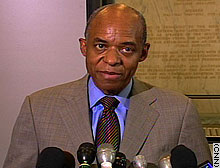|
|||
|
| ||||||||||||||||||||||
Rumpus over FBI raid leads to talk of resignationsFrom John King  Rep. William Jefferson, D-Louisiana, denies any wrongdoing and says he plans to run for re-election. YOUR E-MAIL ALERTSWASHINGTON (CNN) -- Top officials at the Justice Department and the FBI were prepared to resign if President Bush had ordered them to return materials seized from a Congressman's office, two senior administration officials said. They said the situation reached what one called "the tipping point" when some in the administration, led by the vice president's office, argued that FBI overreached with its search of the Capitol Hill office of Rep. William Jefferson, a Louisiana Democrat. Jefferson is under investigation in a bribery scandal. The FBI took documents during a search of the congressman's legislative office, sparking bipartisan outrage on Capitol Hill. (Full story) A potential showdown was averted by Bush's decision to seal the documents for 45 days in the possession of the solicitor general while all sides try to reach a compromise.. (Full story) Attorney General Alberto Gonzales, Deputy Attorney General Paul McNulty and FBI Director Robert Mueller indicated they would resign if forced to give the seized materials back, the officials said. (Watch administration officials make their stand -- 2:02) The resignation talk was relayed to the White House midweek as President Bush came under fierce pressure from House Speaker Dennis Hastert, R-Illinois, and other congressional leaders to return the materials. (Watch Hastert confront the administration -- 1:48) The indirect threats were made during conversations and negotiations, and were usually framed as a hypothetical, said a source familiar with the talks. For example: "If this and this happens, then these may be the consequences," the source said. The threats were not made directly to the president. "It never rose to the level of someone saying, 'If you do this, we're out of here,' " the source said, adding that while there was "plenty of brinkmanship" going on on both sides. But both sides made it clear they didn't want the controversy to reach a showdown, the source said. The two administration officials told CNN that inside the White House Vice Presidential Chief of Staff David Addington took the view that the FBI had crossed a constitutional line. Addington, usually a strong proponent of presidential power, asserted that in this case the FBI went too far and violated the separation of powers. One official said Vice President Dick Cheney met with Bush on the issue and "at a minimum" made the case that the critics of the raid had points that needed to be considered. "I can't say for certain the 'veep' agreed with David (Addington), but I know he relayed those concerns as legitimate," according to the source knowledgeable about the talks. White House counsel Harriet Miers was part of these discussions as well as a few other top officials. The officials said the Justice Department officials were adamant that they had respected the constitutional questions -- giving Jefferson eight months to comply with a subpoena before seeking a warrant and by bringing officials with no involvement in the case to the search site to oversee and monitor that nothing not authorized in the warrant was taken. "Their case is they took every possible step before going to extraordinary lengths and that they had judicial branch authorization and that the congressman was using his office as a barrier to obstruct the investigation," said one of the the senior administration officials. The official added that "their argument is they didn't rush in to this and gave it every possible chance to run another course." The source familiar with the talks said that after Bush ordered the documents sealed, both sides were "changing their tones a little bit," though not backing off their original positions. The source explained that the 45-day time period changes the focus from getting the documents to reaching a solution satisfactory to all parties. A White House spokesperson had no official comment. Justice Department spokesmen had no official comment Saturday, while FBI spokesman Richard Kolko said, "We do not comment on the private conversations between executives."
| | |||||||||||||||||||||
| © 2007 Cable News Network LP, LLLP. A Time Warner Company. All Rights Reserved. Terms under which this service is provided to you. Read our privacy guidelines. Contact us. Site Map. |
|
